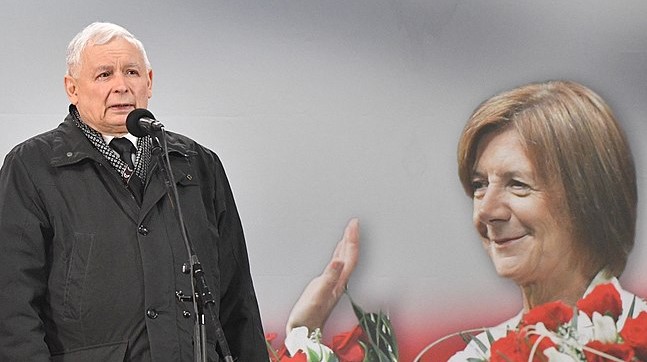Jarosław Kaczyński, the leader of Law and Justice (PiS), promised that under his party’s rule Poland will “fulfil its historical mission” of supporting “everything that is the foundation of Christian civilisation”.
Kaczyński made his speech in Warsaw on 10 November, one day before Poland’s Independence Day, during a commemoration of the 2010 plane crash in Smolensk that killed 96 people, including Lech Kaczyński, Poland’s president and Jarosław’s twin brother.
“We have to take the path towards a stronger and happier Poland that matters more in Europe and in the world. (…) Many in Poland and abroad oppose this direction. (…) This is a path that requires determination, willingness to act and (…) courage. The same courage that was presented by the creators of Polish independence,” said Kaczyński.
Strengthening Poland’s Christian, and specifically Catholic, identity is a core aim of PiS. In the campaign for last month’s parliamentary elections, Kaczyński said that the church represents “the only common system of values” in Poland, even for non-believers. “Beyond the church is only nihilism,” he warned.
PiS has also promised to reinforce Christianity beyond Poland’s borders. In his first interview after being made prime minister in 2017, Mateusz Morawiecki said: “We want to transform Europe, this is my dream, to re-Christianise it”.
The president's chief of staff wants emigrating Poles to be issued with a 'Catholic passport' so that when they reach 'atheising Western European countries they will not succumb to leftist intellectual fashions but remain faithful to God and Poland' 1/2 https://t.co/SWNtRir3Ux
— Notes from Poland ?? (@notesfrompoland) April 24, 2019
Before the 2015 elections, PiS politicians, led by Jarosław Kaczyński and Antoni Macierewicz, promised to “solve the mystery” of the Smolensk crash. They suggested that it was a planned assasination (zamach), and indirectly accused Vladimir Putin and Poland’s government of the time of being responsible.
However, having failed since 2015 to present any convincing alternative explanation to the one delivered by the official investigation (that the crash was an accident), the topic has almost completely disappeared from PiS’s political discourse.
After months of promising a final, decisive report on Smolensk would be published in April, proving the crash was no accident, it has now emerged that the investigatory committee will not publish anything. Instead, there will be a 'multimedia presentation' https://t.co/xem6Fdnq5h
— Notes from Poland ?? (@notesfrompoland) March 8, 2018
Monthly commemorations of the Smolensk crash were a constant element of Polish political life between 2010 and 2018. On the 10th day of every month, people gathered in Warsaw to attend a mass, take part in commemorative processions, and listen to Kaczyński’s speeches, which were often very political.
What was promised to be the last such monthly commemoration took place on 10 April 2018, the eighth anniversary of the crash. However, the tradition of masses and gatherings in front of the monument devoted to the crash’s victims continued.
Those monthly commemorations stirred many controversies, facing not only accusations of politicisation of the tragedy, but also of high costs of police protection (according to estimates, even up to 4.5 million zloty, or over a million euro, per year). They were also accompanied by “anti-commemorations”, or gatherings of people opposed to the tradition.
Kaczyński at 93rd monthly Smolensk march: 'In 2018 we'll reach our goal & marches will stop being necessary [after] everything they've done for truth, for Poland's dignity. We'll have new truly independent Poland'. More in English: https://t.co/gJO5eQkoif https://t.co/biYR7oxwKQ
— Notes from Poland ?? (@notesfrompoland) January 10, 2018
During his latest speech, Kaczyński described the commemoration processions as “an expression of memory, but also of a clear position on the most fundamental issues. On the topic of our nation’s dignity, independence, but also of solidarity – amongst us and with those that passed away”.
The PiS leader praised 2019 as a year that brought “good news and a good decision of the Polish society” – a reference to his party’s election successes.
“The change brought by PiS and its allies since 2015 can be continued. We can continue all the projects, which at the same time serve society and refer to the values that are important to many generations of Poles”, Kaczyński said, naming those values as sovereignty and independence.
Main image credit: Kancelaria Sejmu/ Łukasz Błasikiewicz / Wikimedia Commons (under CC BY 2.0)

Monika Prończuk is the deputy editor of Notes from Poland. She was previously the Nico Colchester fellow at the Financial Times, acting FT Poland correspondent, and journalist at OKO.press, an independent fact-checking media outlet. Her articles have appeared in Quartz, Financial Times, Politico, Gazeta Wyborcza and Tygodnik Powszechny.




















